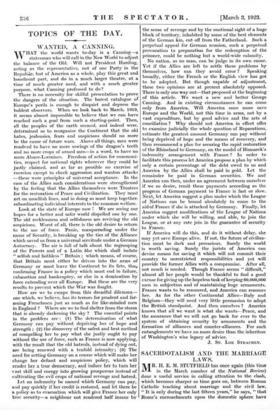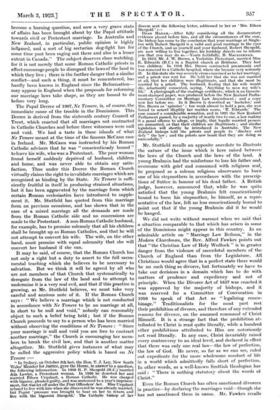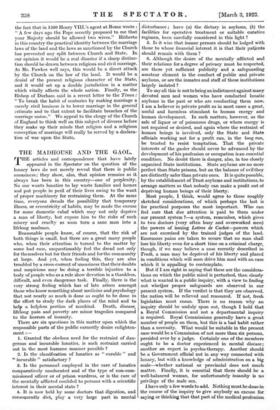SACERDOTALISM AND THE MARRIAGE LAWS.
MR. H. E. M. STUTFIELD his once again (this• time in the March number of the National Review) done a useful service in calling attention to the clash, which becomes sharper as time goes on, between Roman Catholic teaching about marriage and the • civil law. " It is only during the last fifteen years," he says, " that Rome's encroachments upon the domestic sphere have become a burning question, and now a very grave state of affairs has been brought about by the Papal attitude towards civil or Protestant marriage. In Australia and New Zealand, • in particular, public opinion is highly inflamed, and a sort of big sectarian dog-fight has for some time past been raging out there and also in a lesser extent in Canada." The subject deserves close watching, for it is not merely that some Roman Catholic priests in effect encourage people to disregard the laws of the land in which they live ; there is the further danger that a similar conflict—and such a thing, it must be remembered, has hardly been known in England since the Reformation— may appear in England when the proposals for reforming our marriage laws take shape, as they are bound to do before very long.
The Papal Decree of 1907, Ne Tenure, is, of course, the immediate cause of the trouble in the Dominions. This Decree is derived from the sixteenth century Council of Trent, which enacted that all marriages not contracted in Catholic Churches and before three witnesses were null and void. We had a taste in these • islands of what Ne Temere meant at the time of the famous McCann case in Ireland. Mr. McCann was instructed by his Roman Catholic advisers that he was " conscientiously bound " to leave his wife, who was a Protestant. The poor woman found herself suddenly deprived of husband, children and home, and was never able to obtain any satis- faction. Thus under this Decree the Roman Church virtually claims the right to invalidate marriages which are recognized as binding by the State. Ne Temere is suffi- ciently fruitful in itself in producing strained situations, but it has been aggravated by the marriage form which certain Roman ecclesiastics have intreduced to supple- ment it. Mr. Stutfield has quoted from this marriage form on previous occasions, and has shown that in the case of a mixed marriage all the demands are made from the Roman Catholic side and no concessions are made to the Protestant. A non-Roman Catholic husband, for example, has to promise solemnly that all his children shall be brought up as Roman Catholics, and that he will not attempt to convert his wife. The wife, on the other hand, must promise with equal solemnity that she will convert her husband if she can.
It may be said, of course, that the. Roman Church has not only a right but a duty to assert to the full sacra- mental teaching which she believes to be necessary to salvation. But we think it will be agreed by all who are not members of that Church that systematically to derogate from the law of the land and to attempt to undermine it is a very real evil, and that if this practice is growing, as Mr. Stutfield believes, we must take very careful and anxious note of it. If the Roman Church says : " We believe a marriage which is not conducted in accordance with Ne Temere to be no marriage at all, in short to be null and void," nobody can reasonably object to such a belief being held ; but if the Roman Church proceeds to say to a person who has been married without observing the conditions of Ne Temere : "-Since your marriage is null and void you are free to contract • another marriage," the Church is encouraging her mem- bers to break the civil law, and that is another matter altogether. Mr. Stutfield gives instances of what may be called the aggressive policy which is based on Ne Temere :- " In Sydney, on October 5th last, the Hon. T. J. Ley, New South Wales' Minister for Justice, gave the House, in answer to a question, the following information. In 1909 R. P. Shergold (R.C.) married M Lawler, a Protestant woman. In 1920 he deserted her and married Eileen Urquhart, a Roman Catholic. He was charged with bigamy, pleaded guilty, and was sentenced to a year's Imprison- ment, but was let off under the First Offenders' Act. Miss Urquhart refused to live with him when she discovered he was already married, but Papist pressure was brought to bear on her to return and Bye with the bigamist Shergold,' The Catholic bishop of her diocese sent the following letter, addressed to her as Mrs. Eileen Shergold' :- Dawn MADAM,—After fully considering all the documentary evidence placed before him, and all the circumstances of the ease, the bishop has come to the conclusion that your marriage at Single- ton with Robert Shergold is a valid and good marriage in the eyes of the Church, and as yourself and your husband, Robert Shergold, are now willing to live together, his lordship directs me to inform you that you may do so.—Yours faithfully, B. MACKIERNAN. In 1913, Mr. J. W. Brown, a Yorkshire Protestant, married Miss E Edwards (R.C.) in a Baptist church at Brisbane. They had two children. In 1918 Mrs. Brown contracted pneumonia and was removed to a Catholic hospital, where she became very seriously ill. In this state she was severely cross-examined as to her marriage, and a priest was sent for. He told her that she was not married at all, that her children were illegitimate, and that she must be married by a priest. Thehusband, fearing that his wife would die, reluctantly consented, saying, ' Anything to save my wife's life.' A photograph of the marriage certificate, which is on Govern- ment-stamped paper, was produced before the New Zealand Parlia- mentary Committee on Marriage Law Amendment • and a copy now lies before me. In it Brown is described as ' bachelor,' and Mrs. Brown as ' spinster ' : too weak almost to hold a pen, she was forced to scrawl illegibly her maiden name, ' E. Edwards.' I'lic case caused a considerable sensation, and in 1921 the New Zealand Parliament passed, by a majority of nearly two to one, a law making it a penal offence to allege, or imply, that legally married persons are unmarried, or that their children are illegitimate ; and similar legislation will shortly be introduced in Australia. The New Zealand bishops told the priests and people to disobey and defy " the law ; and the priests now boast that they are doing so successfully."
Mr. Stutfield recalls an apposite anecdote to illustrate the nature of the issue which is here raised between the laws of the Church and the laws of the land. A young Brahmin had the misfortune to lose his father and, overcome with grief and consumed with religious zeal, he proposed as a solemn religious observance to burn one of his stepmothers in accordance with the prescrip- tions of Suttee in honour of his dead father. A British judge, however, announced that, while he was quite satisfied that the young Brahmin felt conscientiously bound to burn his stepmother, he himself, as a repre- sentative of the law, felt no less conscientiously bound to point out that if the young Brahmin did it he would be hanged.
We did not write without warrant when we said that a situation comparable to that which has arisen in some of the Dominions might appear in this country. In an admirable article on " Marriage Law Reform," in the Modern Churchman, the Rev. Alfred Fawkes points out that "the Christian Law of Holy Wedlock " is in greater danger from the violence of sacerdotal members of the Church of England than from the Legislature. All Christians would agree that in a perfect state there would be no such thing as divorce, but fortunately we have to take our decisions in a domain which has to do with matters of prudence and expediency and not of principle. When the Divorce Act of 1857 was enacted it was approved by the majority of bishops, and it was reserved for a Committee of Convocation in 1910 to speak of that Act as " legalizing concu- binage." Traditionalists for the most part rest their prohibition of divorce, and therefore of any extended reasons for divorce, on the assumed command of Christ Himself. It is a strange fact that the prohibition at- tributed to Christ is read quite literally, while a hundred other prohibitions attributed to Him are notoriously not read literally. In any case, Christ invariably raised every controversy to an ideal level, and declared in effect that there was only one real law—the law of perfection, the law of God. He never, so far as we can see, ruled out expedients for the more wholesome conduct of life in a world which admittedly falls short of perfection.
In other words, as a well-known Scottish theologian has said : " There is nothing statutory about the words of Christ."
Even the Roman Church has often sanctioned divorces in practice—by declaring the marriages void—though she has not sanctioned them in name. . Mr. Fawkes recalls' the fact that in 1580 Henry VIII.'s agent at Rome wrote " A few days ago the Pope secretly proposed to me that your Majesty should be allowed two wives." Hitherto in this country the practical identity between the marriage laws of the land and the laws as sanctioned by the Church, has prevented any split between Church and State. In our opinion it would be a real disaster if a sharp distinc- tion should be drawn between religious and civil marriage. As Mr. Fawkes well says, this would be a direct attack by the Church on the law of the land. It would be a denial of the present religious character of the State, and it would set up a double jurisdiction in a matter which vitally affects the whole nation. Finally, as the Bishop of Durham said in a recent letter to the Times : " To break the habit of centuries by making marriage a merely civil business is to lower marriage in the general estimate and to that extent to facilitate breaches of the marriage union." We appeal to the clergy of the Church of England to think well on this subject of divorce before they make up their minds that religion and a religious conception of marriage will really be served by a declara- tion of war upon the State.












































 Previous page
Previous page